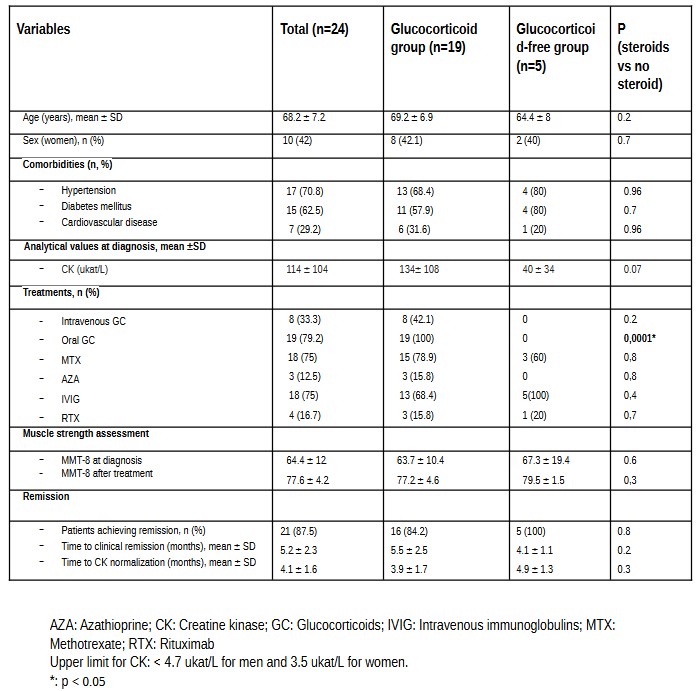Session Information
Date: Sunday, November 12, 2023
Title: (0283–0307) Muscle Biology, Myositis & Myopathies – Basic & Clinical Science Poster I
Session Type: Poster Session A
Session Time: 9:00AM-11:00AM
Background/Purpose: Statin-induced immune mediated necrotizing myopathy (IMNM) is a subtype of inflammatory myopathy associated with anti-3-hydroxy-3-methylglutaryl-CoA reductase (HMGCR) autoantibodies. This condition is characterized by progressive muscle weakness leading to severe disability. Treatment is not well established, but usually includes high doses of glucocorticoids (GCs). Therapeutic effects are often disappointing. Side effects are common and related to the high doses of GCs. Intravenous immunoglobulins (IVIG) may be effective in the treatment of IMNM.
Our aim was to compare two therapeutic protocols in IMNM; a) standard therapy including high doses of GCs, and b) a GC-free protocol.
Methods: Patients consecutively diagnosed with statin-induced IMNM in our centers from January 2017 to November 2022 and followed for at least 3 months were included.
IMNM was diagnosed according to the definition of the European Neuromuscular International Workshop 2016. Clinical data was extracted retrospectively from the patients’ clinical records.
Remission was defined as no disease activity according to 2016 ACR/EULAR response criteria in myositis.
Treatment was assigned to the patients considering the current recommendations and contraindications of the therapies available. In patients with comorbidities that limit the use of glucocorticoids, a steroid-free regime was agreed through a shared decision between the physician and the patient.
Results: We included 24 anti-HMGCR positive patients. Main features and treatment of the patients are summarized in TABLE.
A GC-free regimen based on the use of IVIG 2g/kg every month for at least 3 months was used in 5 (20.8%) patients. The remaining received standard treatment including GCs.
At baseline, general demographic data, MMT-8 and CK levels were similar in both groups. Comorbidities were higher in patients treated with the GCs free protocol.
Remission or low disease activity was achieved in 21 patients (87.5%), including all 5 patients who did not receive GCs (after a mean of 4.1 ± 1.1 months).
However, 3 (15.8%) of the 19 patients receiving glucocorticoids did not achieve remission or low disease activity.
The time to remission or CK normalization was similar in both groups.
Conclusion: In our series of patients with anti-HMGCR positive IMNM, we found that patients can achieve remission without glucocorticoid treatment.
To cite this abstract in AMA style:
Martinez-Lopez D, Corrales Selaya C, Prieto-Peña D, Szczesny P, Notarnicola A, Blanco R, Lundberg I, Dastmalchi M. Remission in Anti-HMGCR Positive Immune-mediated Necrotizing Myopathy Without the Use of Glucocorticoids: A Multicentric Study of 24 Patients [abstract]. Arthritis Rheumatol. 2023; 75 (suppl 9). https://acrabstracts.org/abstract/remission-in-anti-hmgcr-positive-immune-mediated-necrotizing-myopathy-without-the-use-of-glucocorticoids-a-multicentric-study-of-24-patients/. Accessed .« Back to ACR Convergence 2023
ACR Meeting Abstracts - https://acrabstracts.org/abstract/remission-in-anti-hmgcr-positive-immune-mediated-necrotizing-myopathy-without-the-use-of-glucocorticoids-a-multicentric-study-of-24-patients/

